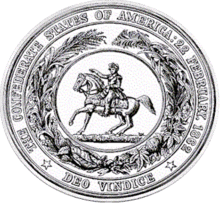Joseph Shepherd Wyon
Joseph Shepherd Wyon (28 July 1836 – 12 August 1873) was an English medallist and seal-engraver.
Life
Born in London on 28 July 1836,[1] he was the eldest son of Benjamin Wyon. He was educated by his father, and studied in the schools of the Royal Academy, where he gained two silver medals.[2]
On 2 December 1858 Wyon was appointed Chief Engraver of the Seals, a post previously held by his father, Benjamin Wyon, and grandfather, Thomas Wyon the elder. He died at Winchester on 12 August 1873.[2]
Works

Wyon's first important work was a medal of James Watt. On Robert Stephenson's recommendation, it was adopted as the prize medal of the Institution of Civil Engineers.[2]
In his work as a medallist, Wyon was aided by his brothers Alfred Benjamin Wyon and Allan Wyon. The medals are often signed "J. S. and A. B. Wyon". They included:[2]

- 1861, Steevens's Hospital medals, Dublin (Cusack prize);
- 1862?, Great Seal of the Confederate States of America.[3]
- 1863, entry of Princess Alexandra into London;
- 1846–65, New Zealand war medal;
- 1867, confederation of provinces of Canada;
- the great seal of the dominion of Canada;
- reception of the sultan of Turkey in London;
- 1867–8, Abyssinian war medal; and
- 1872, Prince of Wales's recovery.
Notes
- ↑ L. Forrer, Wyon, Joseph Shepherd (1916). Biographical Dictionary of Medallists. Volume 6. London: Spink & Son Ltd. pp. 588–592.
- 1 2 3 4
 Lee, Sidney, ed. (1900). "Wyon, Joseph Shepherd". Dictionary of National Biography. 63. London: Smith, Elder & Co.
Lee, Sidney, ed. (1900). "Wyon, Joseph Shepherd". Dictionary of National Biography. 63. London: Smith, Elder & Co. - ↑ Historical Notes, The South Carolina Historical and Genealogical Magazine Vol. 9, No. 2 (Apr., 1908), pp. 102-103. Published by: South Carolina Historical Society. Stable URL: http://www.jstor.org/stable/27575191
| Wikimedia Commons has media related to Joseph Shepherd Wyon. |
- Attribution
![]() This article incorporates text from a publication now in the public domain: Lee, Sidney, ed. (1900). "Wyon, Joseph Shepherd". Dictionary of National Biography. 63. London: Smith, Elder & Co.
This article incorporates text from a publication now in the public domain: Lee, Sidney, ed. (1900). "Wyon, Joseph Shepherd". Dictionary of National Biography. 63. London: Smith, Elder & Co.